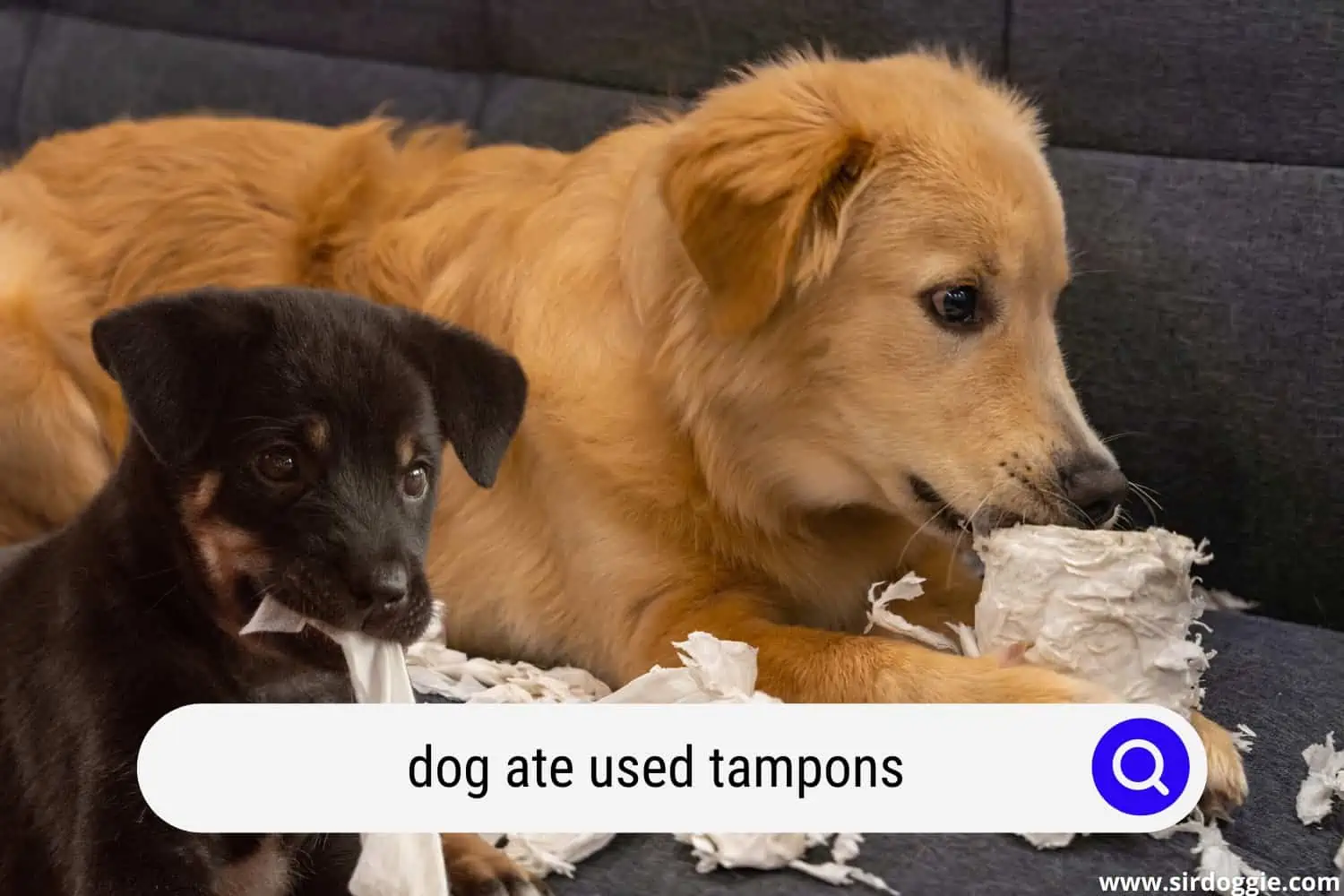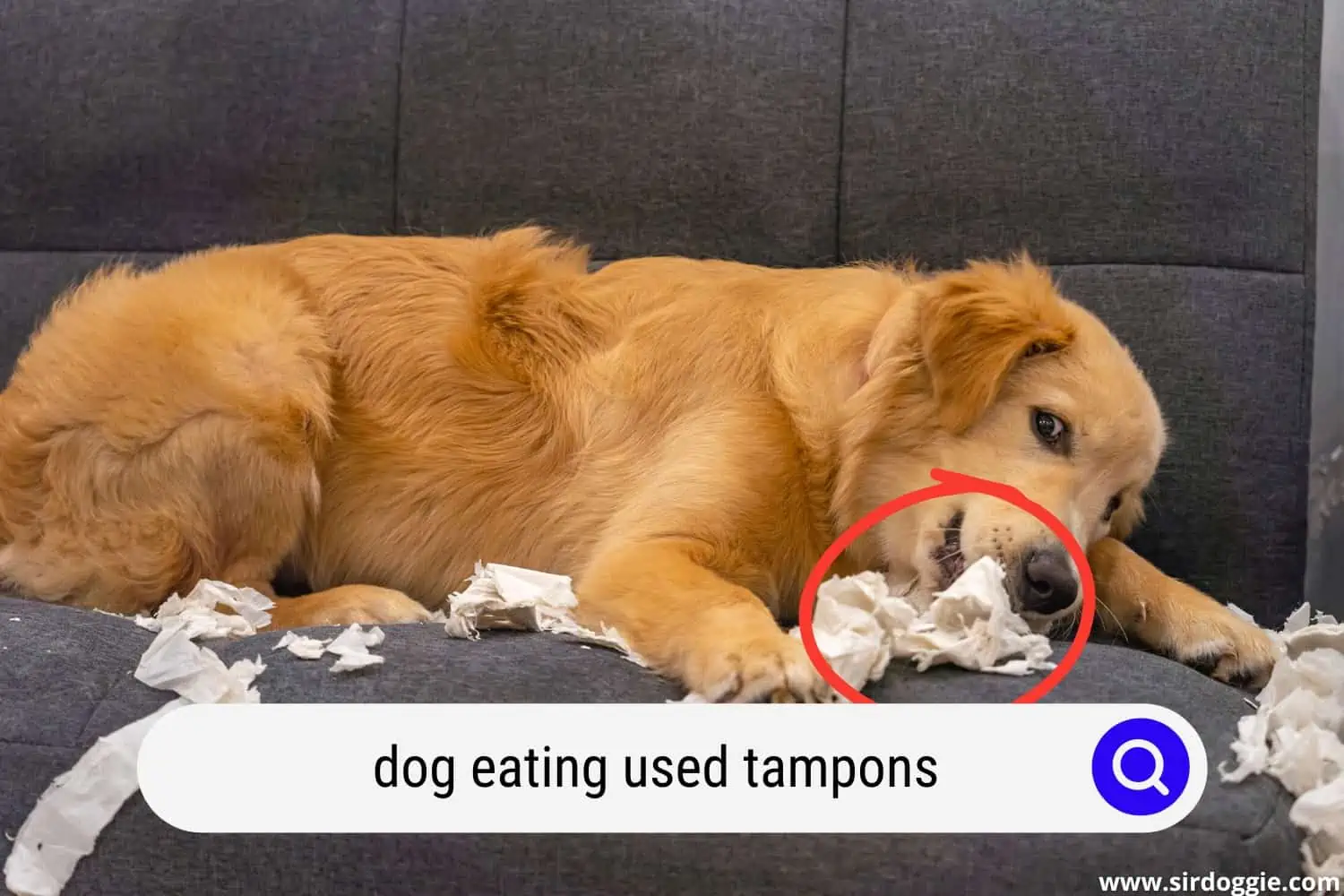Dog Ate Used Tampons: What to Do?
Ah, the curiosity of dogs. They say curiosity killed the cat, but I’d say curiosity killed the dog’s parent.
The shock and disbelief felt by pet parents when their dog has eaten something unthinkable can send them into a frenzy of worry and concern.

So, what to do if you’re dog ate a used tampon? You should always call your veterinarian and monitor your dog’s symptoms, which in some cases may show up after 1-2 days of ingestion.
But don’t feel ashamed or embarrassed, you are not alone.
This could have been an accident on your dog’s part, or it could have been a behaviour with some simple explanations, like missing their parent or being bored.
Dogs can swallow the oddest items from:
- stones
- newspapers
- socks
- underwear
- wood
- plastic
To more unhygienic objects like:
- feces
- dirt
- rotting food
- used tampons
Don’t take your dog’s underwear eating behaviours personally, but do take them very seriously as there can be real dangers threatening your dog’s health when they ingest indigestible items.
Here is what you should do if your dog ate used tampons (along with 5 helping tips to avoid and prevent these situations).
Is It Dangerous for Dogs to Eat Used Tampons?
The presence of foreign bodies in the stomach, like used tampons, can be a serious problem, but it is not always a medical emergency.
Depending on your dog’s size, health, and quantity ingested, the used tampons can be eliminated through feces, vomiting, or they can remain stuck (potentially necessitating surgery).
When dealing with healthy, large breed dogs, the ingested tampons can be more easily eliminated in comparison with the tiny intestines found in small breeds.
The dog’s stomach is structured like a bag created to store large amounts of food that begin the digestion process.
Once swallowed, most foods stay in the stomach for up to 12 hours after entering the pyloric area of the sphincter and then enter the duodenum (intestinal wall).
The ingestion of tampons, or any other indigestible objects, has, firstly, an irritating effect on the gastric mucosa. The results are:
- digestive disorders
- vomiting
- nausea
- local hemorrhage (severe cases)
Afterward, the unknown items can cause blockage in the digestive tract, leading to severe discomfort for your loved one.
Common Warning Signs
The inability to eat, vomit, and/or poop are signs of foreign objects present in the stomach.
In the case of tampon ingestion, your dog might also experience the following symptoms:
- diarrhea;
- loss of appetite;
- nausea;
- bloat;
If your dog’s feces have a black colour it might be because of internal bleeding.
What to Do If My Dog Ate Used Tampons?
You should always call your veterinarian and monitor your dog’s symptoms, which in some situations may appear after 1-2 days from the ingestion of the tampon.
Look inside your dog’s mouth to see if you can pull out the tampon. In case your dog does not poop or vomit the tampon but is experiencing symptoms matching a digestive disorder, you might want to take them to a vet visit as soon as possible.
The best practice is to always take your loved one to a vet after an incident like this, but this is not always financially feasible for pet parents.
Your vet will most likely perform an x-ray to see the location of the ingested tampon. Based on the item’s location, dog’s health, and symptoms, the vet might induce vomiting by giving your dog specific medication.
If this method is not successful, your vet might perform an endoscopy or even surgery (worst case).
The endoscope is made up of a very thin tube, equipped with a tiny video camera that sends images onto a monitor.
The vet can mount a clipper at the end of the endoscope to grab the object swallowed by the animal.
Why Do Dogs Eat Tampons?
Their need for eating tampons is not necessarily related to a preference for tampons but to the ingestion of objects in general.
There are several theories from medical diagnosis to compulsive behaviour disorders, that try to explain this type of abnormal behaviour.
If your dog swallowed just on a strange thing, they likely don’t suffer from an abnormality, and it was probably just an accident.
But if this has been an ongoing issue for you and your dog, you should consider other possible causes.
The habit of eating odd, non-digestive items is known as the pica syndrome.
Most specialists consider it to be a compulsive disorder that should not be left untreated, since ingesting objects hard or impossible to digest can seriously endanger the stomach.
In puppies, the swallowing of indigestible objects is quite common and expected from most pet parents. Puppies are curious, trying to get to know their environment, just like newborns or infants (who require almost constant monitoring once mobile).
Signs of concern arise when, after overcoming this “being-a-puppy period”, the dog still retains this behaviour and/or compulsion.
Boredom can be another cause. A dog that does not receive enough attention from its pet parent, who spends a lot of time alone at home, or who does not engage in physical activity, will channel this pent up energy into such behaviours as eating foreign objects that surround them.
Missing their parent or asking for attention.
A dog missing their parent might develop the habit of swallowing the objects which carry their parents’ scent.
This behaviour might be a sign of frustration, stress, or a need for attention.

5 Tips to Prevent Your Dog from Eating Used Tampons
- Keep the garbage cans away and hidden, especially bathroom garbages which are often left open next to toilets. Try locking or keeping the garbage cans containing the used tampons in a place where your dog cannot reach them. Or consider bathroom trash cans designed to be difficult for dogs. A popular one on Amazon is this one.
- Consult a canine behaviour expert. In the case of a compulsive behaviour disorder, you might need the opinion of an expert to identify the cause leading to this kind of behaviour.
- Training sessions. A dog trainer might be able to use specialized training techniques meant to wean them off this behaviour.
- Prevent boredom. Since this might be a habit developed as a response to boredom, engaging your dog in constant physical activity and more walks will have positive results and eliminate their need for eating strange objects.
- Spraying nasty flavours. To keep your dog away from eating used tampons, spray the tampons or garbage receptacle with unpleasant substances like an anti-chew spray.
Stop The Chew
- The expertly engineered formula uses no alcohol and is safe for use on chew targets including furniture, clothing, shoes, flooring, blinds, plants and more. You can even use it on your dog’s own fur
- Our formula was developed for the specific purpose of training both puppies and adult dogs not to chew
Don’t Forget About ACTUAL Training
While treats and toys may help to entertain and stimulate your Frenchie, they do not replace training. Just like we need to enrich our “human puppies” (a.k.a. children), we need to dedicate time to help our dog’s brains develop.
It can’t just be entertainment and treats 24/7! It’s sort of akin to placing a child in front of a T.V. and expecting to improve their overall behaviour and well-being.
Puppy’s brains are like ours, they are soft and malleable.
Final Thoughts
Never skip a vet visit in these sorts of situations. These are common situations and postponing an appointment with your vet might keep your dog in avoidable pain and discomfort.
In severe cases, the ingestion of a tampon might lead to internal hemorrhage and, worst case, death.
Also, it is not recommended to try and induce vomiting in your own dog, leave this to a vet who knows what they are doing.

Family Dog Expert Author
Hi there! I’m Stuart, a devoted dog lover and family dog expert with over a decade of experience working with our furry companions. My passion for dogs drives me to share my knowledge and expertise, helping families build strong, loving bonds with their four-legged friends. When I’m not writing for SirDoggie, you’ll find me hiking, playing with my beautiful dog, or studying music.